[ad_1]
Nebraska Governor Jim Pillen has announced a new scholarship program for Nebraska students aimed at growing the number of veterinarians serving livestock producers across the state. The Nebraska Elite 11 Veterinarian Program provides financial support to Nebraska students pursuing degrees in animal science or veterinary science at the University of Nebraska-Lincoln’s (UNL) College of Agricultural Sciences and Natural Resources (CASNR).
“The need for production animal veterinarians is undeniable. It’s an issue for Nebraska and other states, as well,” says Gov. Pillen. “Through this collaboration with UNL, Nebraska will be a leader in boosting the number of graduates in this field.”
UNL Chancellor Rodney Bennett voiced strong support for the program, which he said will help the university meet two key goals.
“The Nebraska Elite 11 Veterinarian Program aligns with two key aims of the University of Nebraska-Lincoln — first, to attract, retain, and graduate Nebraska’s best and brightest students; and second, to contribute to resolving pressing issues within the state of Nebraska,” says Bennett. “The University appreciates Gov. Pillen’s leadership and the state’s support of this program that will impact not only UNL but all Nebraskans who benefit from veterinary services.”
Nebraska’s livestock industry contributes more than $6 billion annually to the state’s economy – an impact that is especially significant in rural counties and communities. Veterinarians play a critical role in keeping livestock healthy, improving herd health, and responding to disease and public health issues, among many other services, according to the USDA.
But Nebraska and other states across the country are facing a steep shortage of food animal veterinarians. One reason for this is the cost of veterinary training, according to the USDA. The Elite 11 Program removes the barrier of cost for Nebraska students interested in food animal veterinary medicine.
Dr. Larry Marshall has been a vet in Bertrand for nearly 40 years. He says students tend to return to their home communities to practice, which is both a benefit and a hindrance when it comes to recruiting food animal veterinarians, especially if that hometown is in another state.
“The point is that my plight in trying to find an associate is shared up and down areas of rural Nebraska with other veterinarians. This is a plan that I think is going to get to the root of the problem and it’s going to help solve that problem,” shares Marshall. “Our goal is to find, cultivate, educate, mentor and lead these students down a path that will let them be successful food animal veterinarians in rural Nebraska.”
Up to 25 first-time freshmen will receive the Nebraska Aspiring Animal Production Veterinarians Program Scholarship, which covers 50% of their tuition for the first two years of their study in the College of Agricultural Sciences and Natural Resources at the University of Nebraska-Lincoln.
After the second year, up to 13 of the original 25 scholarship recipients will be awarded a continuation scholarship, which covers 100% of tuition for their third and fourth years of study at UNL. Ultimately, 11 students will be selected as part of the Elite 11. Those students will receive 100% of tuition and fees for UNL’s professional program in veterinary medicine, in which students complete the first two years of veterinary school at UNL, followed by two more years of schooling at the Iowa State College of Veterinary Medicine. Students selected into the program will also receive mentoring and professional development throughout their studies.
“This program presents an incredible opportunity for Nebraska high school students who are passionate about agriculture and animal care to pursue careers in veterinary medicine without the burden of student loan debt,” says Tiffany Heng-Moss, dean of UNL’s College of Agricultural Sciences and Natural Resources. “This is an important program that will have a big impact on our state, our agriculture industry, and on the students who take part in it. I’m grateful to Gov. Pillen and the state of Nebraska for making this possible.”
Gov. Pillen adds: “Based on my own experience, I know how academically demanding it is to pursue a degree in veterinary medicine. It’s becoming even harder to find students who are interested in large animal care. This program aims to close that gap and produce experts in the field who can ably work with farmers and ranchers and continue to ensure Nebraska’s place in providing quality food products across the globe.”
Graduates of the Elite 11 Program are required to stay in Nebraska and practice as a production-animal veterinarian for eight years. Application instructions for the first cohort of the program are now available at casnr.unl.edu/elite11. Applications will be accepted through April 12. Scholarship recipients will be notified in late May.
“The Elite 11 Program brings together two of the things we are most passionate about at UNL – supporting Nebraska students and fulfilling our land-grant mission,” says Mike Boehm, NU Vice President and Harlan Vice Chancellor for UNL’s Institute of Agriculture and Natural Resources. “It’s truly a win-win.”
[ad_2]
